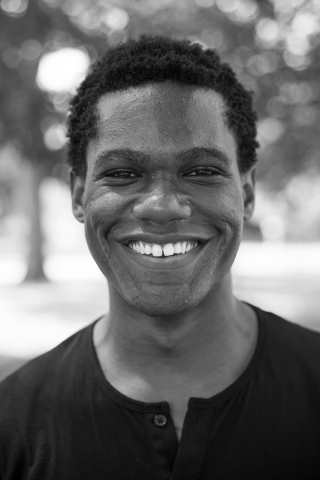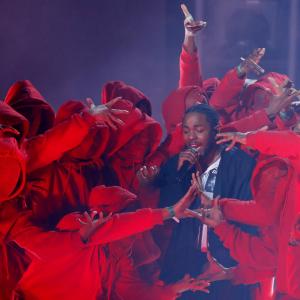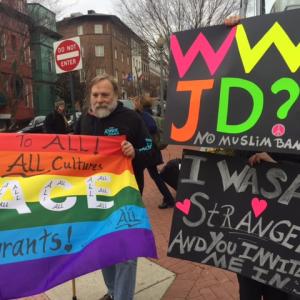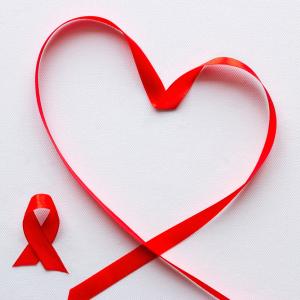
Da'Shawn Mosley is an editor and journalist in the Washington, D.C., metro area whose beats include the arts, LGBTQIA issues, race, and U.S. politics. He is also a fiction writer, poet, and essayist. Da'Shawn earned a B.A. in English Language and Literature from the University of Chicago, studied creative writing at the South Carolina Governor's School for the Arts and Humanities, and was featured in the PBS documentary Becoming an Artist. His fiction earned him the 2019 A Suite of One's Own: A Writer's Residency, awarded by Kiese Laymon, and he has been published in America magazine and The Adroit Journal.
Posts By This Author
#WomenCrushWednesday: Toni Morrison, A Champion of Black Literature
Morrison’s wisdom and her immense love for blackness — a heritage, but also a color often used to describe evil and evoke disgust — have been blessings to the world for almost half a century. She has written and published eleven novels, numerous children’s books and nonfiction books, two plays, a libretto for an opera, and despite being 87-years-old, she shows no signs of stopping.
The 'Prestige' of the Grammys Denies Great Art
In a world that’s all about the Benjamins, in which art is endlessly asked to compromise to rake in the dough, artists need as much support as they can get to create art that questions the status quos of their medium and our society. Great art depicts us as who we are, while it also shows us who we can be. If we don’t give it the attention it deserves, and reward it accordingly, fewer artists will be brave enough to give us work like Kendrick Lamar’s sonically raw Christian social justice commentary To Pimp a Butterfly; Lorde’s boundary-testing, lyrically complex Melodrama; or Beyoncé’s soul-bearing, historically sweeping musical project Lemonade.
Can This Country Be Saved?
TA-NEHISI COATES is an atheist, but in We Were Eight Years in Power he atones for sin. In a 2008 article about Bill Cosby for The Atlantic, Coates failed to thoroughly report on the sexual assault allegations brought against the comedian, only mentioning them briefly. On page 12 of We Were Eight Years in Power, Coates repents. “That was my shame,” he writes. “That was my failure. And that was how this story began.”
By “this story,” Coates means his ongoing career as a correspondent for The Atlantic, during which he has received a MacArthur genius grant, a National Magazine Award, and several other honors for his writings on race in America. Coates is one of the nation’s most popular living chroniclers of the plight of African Americans. But despite that, he is acutely aware of his failings.
We Were Eight Years in Power is both a collection of Coates’ best articles published by The Atlantic and criticism of those pieces. Prefacing most of the articles are short essays by Coates about the stage of life he was in when he wrote each article, the pieces’ triumphs, and their flaws. With sometimes savage specificity, the essays map the evolution of Coates’ writing skills as well as his personal foibles. At the same time, the articles themselves document the flaws of the United States and how the country consistently does wrong by its African-American citizens in favor of doing more than right by its white citizens.
Coates’ writing process is a metaphor for the social corrective he pursues: the abolishment of white supremacy.
A Different Kind of Healing Ministry
Ruby Garner is a health educator for Health People, an organization in New York’s South Bronx that provides services to people in need. She is an adviser to the AIDS Institute of the New York State Department of Health and partners with her church, First Corinthian Baptist in Manhattan, to provide medical care to its lower-income neighbors.
Website: healthpeople.org
1. What inspired you to partner with your church? Being able to give to my community, which has a lot of disparities, and deliver information and resources to people who need them is my passion. Working at Health People, I do presentations on behalf of the state of New York on diabetes prevention, health care for women, HIV, how to establish and maintain healthy relationships, and other topics. It made sense to take what I already do and bring it to my church.
The Horror of 'I, Tonya'

Image via "I, Tonya"/Facebook
From rural, residential life to news cameras to FBI investigations, I, Tonya is a sweeping view of an America that has barely changed since 1994, and certainly hasn’t improved much. It’s a film about how, in the words of screenwriter Steven Rogers, “America wants someone to love, but they also want someone to hate.”
2017 Is the Year of ‘When Did You Know?’
On 2016, David Axelrod, the chief strategist of Barack Obama’s presidential campaigns, interviewed Jon Stewart at the University of Chicago, my college campus, for his CNN podcast The Axe Files. I was in an audience of students eager to see the former host of The Daily Show return to the public eye, and I’d wanted to ask him a question during the Q&A portion. I didn’t get to, but I am confident that even if I had, my question would not have been as important as Dan Ackerman’s.
The Personal Is Protest
REV. OSAGYEFO Uhuru Sekou’s album In Times Like These does something I’ve never witnessed any other recorded musical project do: It sings before track one even begins. Printed on the inside of the album’s CD case is one of the most powerful commentaries on the 2016 U.S. presidential election I’ve read. “The Task of the Artist in the Time of Monsters,” written by Rev. Sekou, is simultaneously an artist statement, a poem, and a call to action for the world to engage passionately in “the art of loving and living.”
Sekou’s album is a rousing sermon that may re-energize social justice activists who listen to it, keeping them engaged in “the movement.” At the same time, it’s also an extended prayer of sorts, lamenting the wrongs of the world and asking God to alleviate society’s pains. “In times like these / we need a miracle,” Sekou sings in the chorus of the album’s title track, one of the project’s standouts.
However, despite his call for divine intervention, Sekou doesn’t allow believers in a higher power to sit back and rest assured that God will do the work they should be doing. He completes the chorus of the song “In Times Like These” with the much-appreciated but potentially controversial statement: “Ain’t nobody gonna save us / We the ones we’ve been waiting for.” In a time that calls for bold, social justice-minded commentary from artists, Sekou delivers.
Kendrick Lamar Is a Great American Writer, But There Is Room to Grow

Image via Kendrick Lamar Facebook
For what the singer/songwriter/music producer Pharrell said two years ago about Kendrick Lamar is absolutely true. Kendrick Lamar is the Bob Dylan of his generation, an American storyteller on the same plane as Toni Morrison, Eugene O’Neill, Pearl S. Buck, and other U.S. Nobel Prize in Literature laureates. Why this statement may seem overblown is because of highbrow bias against hip-hop, which is to say bias against black language, black storytellers, black people. But, to quote Chuck D, the leader of the rap group Public Enemy, hip-hop is “CNN for black people.” And Lamar is the best reporter in the business.
‘The Shack’ Is One More Disappointing Reminder that ‘Christian Art’ Is Often Bad

Image via The Shack Facebook.
The Gospel isn’t simplistic, and its representations shouldn’t be, either. If The Shack were created with this creed in mind, perhaps it would be a better work of art. Instead, sadly, it’s nothing more than a religious tract.
Hidden Racism
“Here at NASA, we all pee the same color,” says Harrison.
But this scene never happened. Harrison never took a crowbar to a “Colored Ladies Room” sign. He never solved Johnson’s dilemma of having limited accessibility to a legal bathroom. Harrison’s action is a fabrication framed as history, one that could easily be recognized as an insidious white savior narrative created and advanced by the white people who made the film.
The Melancholy of Race

Image via Amy León Facebook
The first time I saw Amy León, she was standing in a church that was about to explode. Or had already exploded — I couldn’t tell. I was watching the music video for her song “Burning in Birmingham,” a reenactment of the 16th Street Baptist Church bombing that took the lives of four black girls on Sept. 15, 1963 in Birmingham, Ala.
'Religious Freedom Has Never Been Unfettered'
“Religious freedom has never been unfettered. It has always been the case that you are free to exercise your religion — as long as it’s not hurting anyone else,” Bishop Gene Robinson said.
We Have to Hold President Obama — and Ourselves — Accountable for Naive Rhetoric
America rests on a foundation of sin. Its body is strong but its soul is dead. Yes, America provides so much freedom and benefits so many lives. But woe to us if we look at this country’s glass as half full when so many of our fellow citizens barely have water at all. Woe to us if we praise the calm in our lives while failing to give the distress of others’ lives the full attention it needs.
Any speech about America that fails to look at this nation’s current state with the realism and gravity it deserves is speech about a country that doesn’t exist. The America that President Obama spoke of, in his farewell address, is an America I barely recognize.
To Resist Trump's Rhetoric, Hollywood Must Diversify

Image via Disney - ABC Television Group/flickr.com
Let us not forget the impact that D.W. Griffith’s The Birth of a Nation had on America when it was released in 1915. An adaptation of the novel The Clansman: A Historical Romance of the Ku Klux Klan, there’s little doubt in my mind that the film’s racist depictions of African Americans and affirming depictions of Klansmen formed and hardened the discriminatory beliefs of many white people in the U.S., making them further believe that black people were undeserving of fairness, respect, and freedom. The Birth of a Nation is a prime example of why we need new stories, told from the perspective of identities that are generally ignored and denigrated.
Don't Let Christian Morals Get In the Way of Christian Love
It’s safe to say that no Christian community I've been a part of has ever brought up the U.S. domestic crisis of HIV/AIDS. In fact, I can’t recall ever hearing an American Christian even utter the words.
And in conversation with others, I know that too many have only heard about it from pastors who preach that homosexuality is an unforgiveable sin and that HIV/AIDS is God’s wrath at work — despite the fact that HIV/AIDS affects people of many ethnicities and sexual orientations, and that the infection is often transmitted in ways other than sexual intercourse. Hearing Christians speak seriously and nonjudgmentally about HIV/AIDS, with the intent of acting to help eradicate the illness and protect the lives of those whom the illness has affected, is too rare.
Stop Telling Me to Fight

Image via Joseph Gruber/Shutterstock.com
Stop telling me to fight. Stop saying on your social media platforms, and in your blogs and your op-eds, that everyone should dust themselves off and get up and fix this. Stop saying that addressing this issue is everyone’s duty, because I can’t even begin to explain to you how far from the truth such a statement is.
But I’ll try. I will overcome my exhaustion and explain this to you as clearly as I can, and you can thank me later, if you’re so inclined. Let it be known that I like Edible Arrangements.
Debbie Allen's New Musical 'Freeze Frame' Addresses Gun Violence in America
The project which Allen spoke of, titled Freeze Frame…Stop the Madness, is a work of theatre written, choreographed, and directed by Allen that combines cinema, dance, and music into a stage performance inspired by the issues of race and gun violence in America. Freeze Frame opened at the Kennedy Center for the Performing Arts in Washington, D.C. on Oct. 27 and, on Oct. 24, Allen visited the Center for American Progress, in the nation’s capital, to discuss Freeze Frame’s creation and the impact she hopes the show will have on the U.S.
'Moonlight' Is the Best Film I Have Ever Seen

Image via Moonlight Facebook.
There are some works of art that become landmarks in a person’s life. The person knows who they were before they encountered the art, but not who they are afterward, and among the pieces of themselves that have scattered to the floor they find new elements, new additions to their identity. Moonlight is undoubtedly one of my landmarks. It is my Washington Monument, my Statue of Liberty. It is all of that and more.
'The Birth of a Nation' Doesn't Deserve Your Attention

Image via Ga Fullner/Shutterstock.com
I equate financially supporting The Birth of a Nation with ticket sales or a DVD purchase "because it's important" with supporting Brock Turner’s release from prison "because he’s a great swimmer and has potential." Both send a message to rape victims worldwide: They will always be ranked as lesser than their accuser, and lesser than something intangible.
A Brand New Day: Inside the National Museum of African American History and Culture
So there was a gloom and reverence with which I walked through the first three levels of the museum, and with which many of the people around me also seemed to travel. We were in the presence of ruins from days when black bodies were treated like cattle and felled like sugar cane crops. We were staring at the adornments of Ku Klux Klan members, at shards of glass from the 16th Street Baptist Church, and we were doing so only days after yet another police shooting of yet another unarmed black man. Death was in the air, and we were the bereaved.











